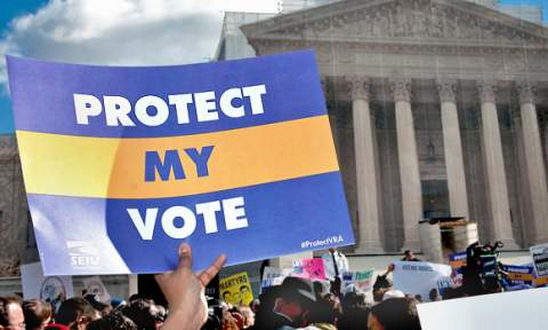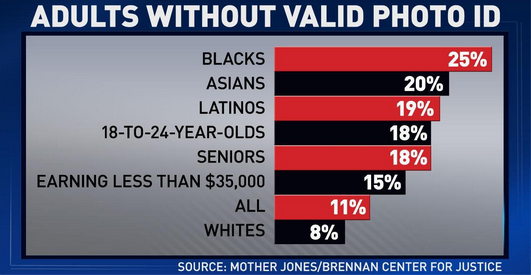“Fifty years ago Dr. King fought to expand the opportunity to vote,” Rev. William Barber, president of the North Carolina NAACP, exclaimed, “Today we are in a battle to stop this state taking rights away from North Carolina Citizens – this is our Selma.”[ref]Pilkington, Ed. “’This is our Selma’: North Carolina Voting Rights Trial Threatens 50 Years of Progress.” The Guardian. July 13, 2015. http://www.theguardian.com/us-news/2015/jul/13/voting-rights-trial-north-carolina-discrimination-black-voters.[/ref] Voter ID laws like those in North Carolina are ubiquitous—21 states have put restrictions on the books over the past five years, according to the Brennan Center, a non-partisan institute specializing in voting rights.[ref]Ibid[/ref] Unsurprisingly, the majority of these voting restrictions are being implemented in states and districts that were formerly covered by section 5 of the Voting Rights Act (“VRA”), which “prevented largely southern states from tampering with voting laws without prior approval from the federal government.”[ref]Ibid[/ref] Despite the strides we have taken since the days of poll taxes and literacy tests, in Shelby County v. Holder (2013), the Supreme Court engaged in an almost unprecedented showing of judicial activism, effectively taking the reins away from the legislature in determining whether section 5 of the VRA—the very teeth of the law—was still a necessity, upon which Congress overwhelmingly agreed in the affirmative in 2006. That being said, however, there is reason to believe that these discriminatory voter restrictions that disproportionately impact black, young, and elderly voters actually have the opposite effect on voter turnout—that there is a backlash phenomenon to these voter restrictions that has in fact increased voting participation among these groups, particularly African Americans; according to the Census Bureau, black and/or Latino turnout exceeded white voter turnout in each of the four southern Voter ID states in 2012. [ref]Gaughan, Anthony J. “Has the South Changed? Shelby County and the Expansion of the Voter ID Battlefield.” 19 Texas Journal on Civil Liberties & Civil Rights 109 (Fall 2013).[/ref] Thus, the question must be asked: Is this paradoxical increase in political participation, despite the discriminatory means of achieving it, something to be desired?
In essence, the vendetta addressed here is whether the practical—though counter-intuitive—impacts of voter restrictions on political participation outweighs the principles and motives underlying Republican attempts to decrease the turnout of traditionally Democratic voters like African Americans. Republican state legislatures have implemented myriad measures to decrease Democratic voting numbers, and North Carolina’s are among the most brazen: reduction of early voting days (African Americans tend to vote earlier than white voters); end of same-day registration (which was in place in the 2014 mid-term elections, and which plaintiffs in the upcoming North Carolina voting rights trial say disenfranchised thousands of black voters); elimination of out-of-precinct voting (expert opinion shows that black voters disproportionately utilize this method); and prohibition of pre-registration drives targeting young people (the most progressive generation of existing voters).[ref]Pilkington, 2015.[/ref] According to Chief Justice John Roberts in his majority opinion in Shelby, the preclearance formula employed in section 5 of the VRA was “based on decades-old data and eradicated practices,” yet the same jurisdictions previously covered by section 5 are precisely those ushering in waves of new restrictions upon section 5’s elimination.[ref]Gaughan, 2013.[/ref]
Further complicating the issue is that, according to several polls—including a July 2012 Washington Post poll—about 74% of Americans support a requirement that all voters show photo identification.[ref]Ibid[/ref] But one must consider what exactly each of the two political parties wants: while Republican legislators want to discourage and restrict voter turnout, Democratic legislators seek to incorporate as many voters as possible into the election cycle. This is at the core of the issue, and is indeed most telling. Additionally, supporters of these voter restrictions must ask themselves: Do Democrats benefit from voter fraud, or do they benefit from higher voter turnout? Because in the case of the latter, it is truly an injustice to promote these discriminatory laws, regardless of which party one affiliates with. Furthermore, even though studies have shown a correlation between these voting restrictions and a paradoxical increase in African American voter turnout, the fact remains that “in the thirty states that had voter ID laws in effect in the 2012 election, 65.2% of minority youth were asked to show identification, compared to 50.8% of white youth.”[ref]Ibid[/ref] And as long as these laws are being disproportionately enforced upon any single group of voters, the ends do not justify the means. In fact, it borders on the realm of ridiculous to assert that these laws are intended for anything other than to decrease Democratic voter turnout; just take a look at the five southern states that moved ahead with Voter ID laws within 24 hours of the Shelby decision: Texas, Mississippi, Virginia, South Carolina, and Alabama; all of which were previously covered by the VRA’s preclearance provision.[ref]Ibid[/ref] Do these states suffer disproportionately from voter fraud, or are they run by Republican legislatures who benefit politically from discouraging the minority vote?
The fact of the matter is that voter fraud is not a rampant crime in the United States, and both the Democratic and Republican parties would likely benefit from laws which seek to encourage, rather than discourage, voter turnout. Researchers Elan Hope and Robert Jagers have gone to lengths to stress the importance of civic education to one’s future civic engagement. “Youth who reported taking a civics course during high school,” they write, “were involved in more civic and political activities, ranging from voluntary community service work, political discussions and campaigning, to boycotting.”[ref]Hope, Elan C. and Robert J. Jagers. “The Role of Sociopolitical Attitudes and Civic Education in the Civic Engagement of Black Youth.” Journal of Research on Adolescence 24(3) (2014): 460-470.[/ref] In sum, legislators seeking to alter voting laws should look beyond the next election to what will benefit the electorate in the long run—namely, easier conveyance of candidate policy stances, mandatory civic engagement classes in public schools, as well as mandatory voter registration upon turning eighteen years old. As an example, in recent years the U.K.’s central government has “sought to harness local authorities to its own active citizenship agenda.”[ref]Andrews, Rhys, Richard Cowell, James Downe, Steve Martin, and David Turner. “Supporting Effective Citizenship in Local Government: Engaging, Educating and Empowering Local Citizens.” Local Government Studies 34:4 (2008): 489-507.[/ref] In addition to implementing a comprehensive citizenship education initiative in public schools, local authorities are expected to make young people aware of the ways in which they can influence local policies.[ref]Ibid[/ref] Additionally, active citizenship legislation in Australia, South Africa and the Dominican Republic has resulted in improved political literacy and increased voter turnout.[ref]Ibid[/ref]
Take Action:
Since the Shelby decision, voting rights across large swaths of the U.S. have been under siege by legislatures standing to benefit from lower turnout rates among minority voters. In order to play your part in the fight to preserve the integrity of our country’s most cherished, foundational tradition, visit Project Vote, and donate to this revered voting rights advocacy organization now.





